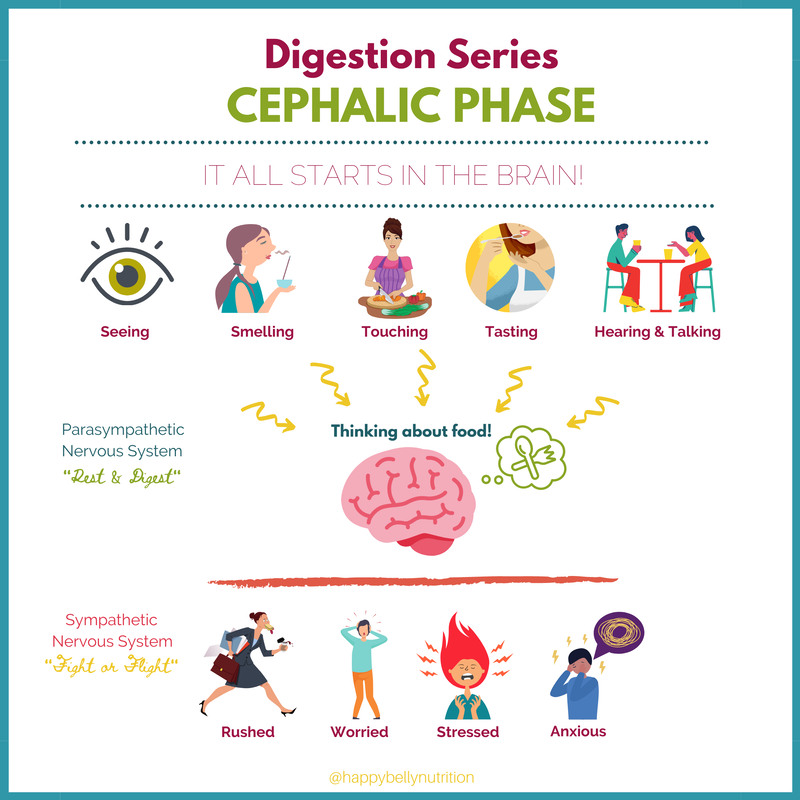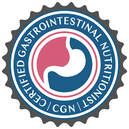|
Using our five senses (seeing, smelling, hearing, touching, and tasting) we trigger the start of digestion via the cephalic phase. Our senses stimulate the parasympathetic nervous system (rest & digest) to communicate via the vagus nerve to our enteric nervous system which governs our gastrointestinal tract. This results in the release of a variety of different neurotransmitters, chemicals, and hormones that stimulate the parietal cells to secrete stomach acid and to stimulate the stomach to start churning slowly. It is as if we placed a skillet on the burner and turned it on. Overall the cephalic phase contributes to about 30-50% of our total stomach acid production! And did you know that simply talking about food can stimulate this same response? A research study from 1986 found that simply talking about appetizing food for 30 minutes without seeing it, smelling it, or tasting it, increased stomach acid secretion by 66% whereas seeing and smelling food only stimulated stomach acid secretion by 23-46%. Other topics of conversion did not elicit any stomach acid production. This goes to show, that what we are thinking directly impacts our digestion more than what we are seeing or smelling, and that seeing and smelling really just stimulate stomach acid production because we start THINKING more about food. Now let me put this into perspective. What is different between these two scenarios? Scenario #1: It’s breakfast time! You go to the fridge and quickly pull out a mason jar of chia berry overnight oats even though you really don't have appetite for it. Instead of sitting down you eat a few bites, get dressed, eat another few bites, put on your shoes, and then gobble down the rest. You quickly grab your bag and head to the car to go to work. Scenario #2: It’s breakfast time! You look into the fridge, think “hmmm, what sounds good? Oh yea, a fried egg on avocado toast sounds delicious!” You heat up the skillet, add a little dollop of butter and hear it sizzle, you crack open the egg on the skillet and hear “tsishhhh” as the egg hits the heated pan. You place a piece of toast in the toaster and wait until your egg and toast are done. As you wait, your appetite builds and builds, and you can’t wait to enjoy the ooey, gooey delicious mess that awaits you. Your toast pops up, you top it with creamy avocado, your crispy, fried egg, and sit down at the table to enjoy this fork and knife breakfast meal. Although both meals are healthy choices, scenario two allows for optimal digestion because not only is more time spent thinking about food, but the preparation of the food allows all of the senses to be active. If scenario one is your go-to relationship with food, then it is no surprise why you may feel overly full and bloated. When eating in a rushed, hurried, and stressful state of mind, we inhibit the parasympathetic nervous system, and therefore inhibit the stimulation of the vagus nerve and the enteric nervous system. Our energy is shunted away from “rest and digest” and rather focused towards “fight or flight” and our sympathetic nervous system. Since the cephalic phase primes the gut for the meal to come, we cannot overlook how powerful it is to simply, slow down when it comes to food. We must allow time in our busy days to appreciate and to look forward to the foods and meals we consume. The saying “eat to live” easily distracts us away from the importance of acknowledging our food as something more than just simply fuel but as something that should be enjoyed. Seeing food through the eyes of a “foodie” can be one very helpful step that can enhance your gut health. Some Tips from your Gut Health Expert:
Are there any changes you are willing to make to your eating routine to enhance your cephalic phase? Share with me below! References: 1) Feher. Quantitative Human Physiology (2nd Edition). The Stomach. 2017. 2) https://www.gastrojournal.org/article/0016-5085(86)90943-1/fulltex
0 Comments
Leave a Reply. |
AuthorLike to read? Then get your evidence based nutrition information here! All posts written by Selva Wohlgemuth, MS, RDN Functional Nutritionist & Clinical Dietitian Archives
August 2023
Categories
All
|
Providing custom functional nutrition therapy since 2015.
Follow HBN on Social Media!
©Happy Belly Nutrition, LLC 2015-2023
Proudly powered by Weebly



 RSS Feed
RSS Feed


